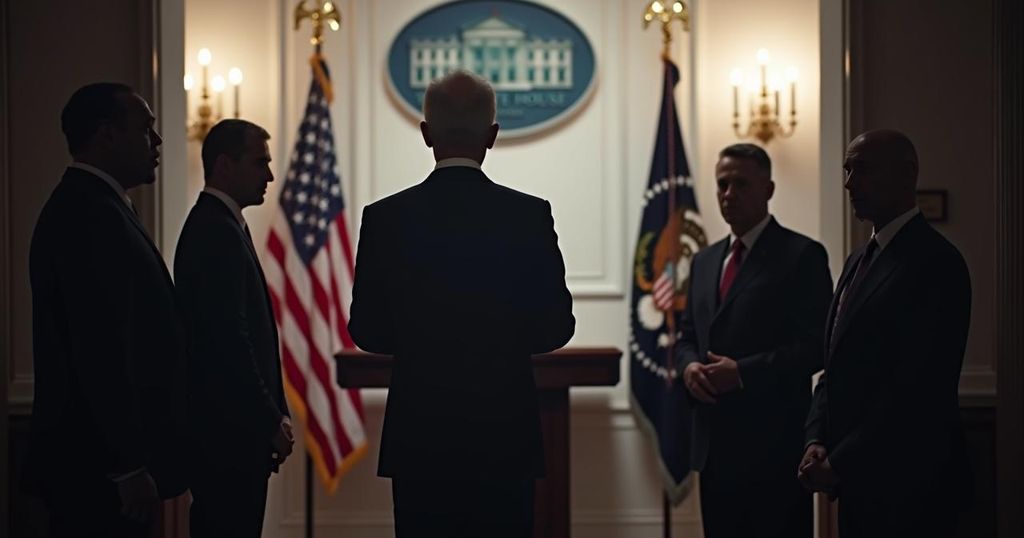President Biden Raises Concerns Over Election Violence During Briefing Room Appearance
President Biden addressed the press in the White House briefing room for the first time, raising alarms about potential violence in the upcoming election, referencing rhetoric from former President Trump as dangerous. His appearance, which came with a humorous remark about rejoining the presidential race, indicates a notable shift in his media engagement as he confronts public concerns over the electoral climate.
President Joe Biden made a notable appearance in the White House briefing room for the first time since taking office, where he expressed concerns regarding the potential for violence in the upcoming election. During this unexpected 15-minute session, prompted by NPR reporter Tamara Keith, President Biden remarked on the uncertainty surrounding the election, stating, “I am confident it will be free and fair. I do not know whether it will be peaceful.” He highlighted the possible repercussions of rhetoric from former President Donald Trump, which he deemed highly dangerous. Biden also noted apprehension about certain Republican leaders, particularly mentioning Ohio Senator JD Vance, who has not committed to accepting election outcomes, drawing implications of further unrest. Despite the levity of his declaration about re-entering the presidential race in response to a reporter’s question—a comment met with laughter—the backdrop of his remarks signals a serious acknowledgment of the fraught political landscape leading into this election cycle. His surprise presence saw sparse attendance, with many seats unoccupied, and questions predominantly diverted to issues regarding the conflict in the Middle East. This marks a shift for the outgoing president, who had previously limited his press interactions and had recently resumed more frequent engagements, likely influenced by the pressures of ending his presidential term effectively. While departing the White House for a trip, President Biden faced scrutiny, evidenced by remarks he made about the possibility of Israel attacking Iran, contributing to fluctuations in crude oil prices. This further underlines the potential volatility surrounding his communications. Furthermore, during the briefing, President Biden momentarily confused Hurricane Helene with “Hurricane Helena,” illustrating the challenges he faces with public speaking. As the president prepares to exit the White House on January 20, following the conclusion of his term amidst concerns over his cognitive abilities, his decision to address the media more freely signifies an effort to mitigate any narrative that might undermine confidence in the electoral process and his administration’s leadership.
With the November elections approaching, President Biden’s warnings about the potential for violent disruptions echo growing concerns regarding the stability of democratic processes in the United States. The political landscape has been significantly influenced by Trump’s controversial statements regarding election integrity and acceptance, setting a tense atmosphere for voters and officials alike. Biden’s recent decision to increase visibility and engagement with the media may be an attempt to counterbalance fears surrounding the electoral atmosphere while reaffirming the commitment to a free and fair election. After facing pressure from within his party about his age and effectiveness as a candidate, the president’s active communication strategy serves as a response to the uncertain political climate and an effort to reassure the public.
In conclusion, President Biden’s debut in the White House briefing room amid concerns of election violence underscores a critical moment in U.S. politics as the nation approaches a contentious electoral period. His comments reflect not only his apprehensions regarding potential unrest but also highlight the broader political challenges facing the administration as it navigates heightened tensions and public scrutiny. As he embraces a more open communication style, Biden’s intention appears clear: to instill confidence in the electoral process and tackle the narratives that may undermine democratic stability.
Original Source: nypost.com




Post Comment